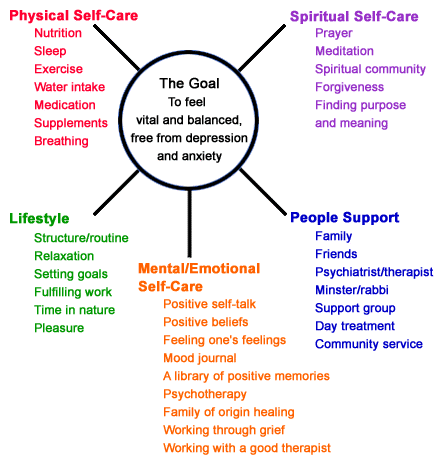28 Self-Care
THE IMPORTANCE OF A SELF-CARE PLAN
In a profession that seeks to improve the self-efficacy and health of others, it is vital that counselors have their own self-care plan that encompasses their self-help strategies. As there is no one size fits all plan, self-care refers to the activities and practices that are engaged in on a regular basis to maintain and enhance a person’s health and well-being. Everyone encounters bumps in the road of life or the downward swings of the roller coaster experience we all experience. As these stressful events can lead to physical, emotional, and mental stress, a self-care plan is vital, especially in the realm of counseling.

Because we are all have our own unique life history, face different circumstances, stressors, and challenges, all of us will need to develop our own self-care plan. However, “despite the uniqueness of our individual self-care needs, there are objectives common to almost all such plans: taking care of physical health, managing and reducing stress, honoring emotional and spiritual needs, nurturing relationships, and finding balance in school and work life” (http://www.socialwork.buffalo.edu/students/self-care/developing-maintenance-plan). I have outlined my self-care plan below:
Physical Health
- Participate in a recreational basketball league
- Attend Zumba classes 3 times each week
- Although I often struggle, I strive to make healthy food choices
Managing and Reducing Stress
- Cardiovascular exercise
- Hiking/Walking trails
- Listening to relaxing music
- Using relaxation techniques such as deep breathing and meditation
- Striving to not procrastinate
- Be organized to reduce anxiety
Emotional and Spiritual Needs
- Attending church and bible study on a regular basis
- Praying
- Bible reading
- Not dwelling on past mistakes
- Not dwelling on issues related to previous relationships
- Realizing it is ok to cry. (As this is the body’s way of releasing stress)
Nurturing Relationships
- Taking time to spend with friends, family to maintain trust and comfort
- Seeking to establish positive relationships with my students
- Striving to form meaningful, professional relationships with coworkers
- Spending time to talk to Christ to maintain the most important relationship I have.
Finding balance in work, school and life
- Although often difficult, I strive to not take work related stress home
- Striving to be organized and prepared so I do not have to spend a lot of time working or doing homework at home
- Forming positive relationships with students, classmates and professors so I can easily ask for assistance when needed. (This will relieve stress related to work and school.)
SELF CARE RESOURCES
Below are some links to valuable resources that can be used for one’s own self-care plan and for helping others develop their own self-care strategies.
Tips and steps to get started:
http://www.socialwork.buffalo.edu/students/self-care/developing-maintenance-plan.asp
Lifestyle behavior assessment to see what strategies are needed:
http://www.socialwork.buffalo.edu/students/self-care/documents/plan/Lifestyle_Behaviors.pdf
Self-Care Assessment
http://www.socialwork.buffalo.edu/students/self-care/documents/plan/Self-Care_Assessment.pdf
Maintenance and self-care worksheet
http://www.socialwork.buffalo.edu/students/self-care/documents/plan/My_Maintenance_Self-Care_Worksheet.pdf
Developing Emergency Self-Care Plan
http://www.socialwork.buffalo.edu/students/self-care/developing-emergency-plan.asp
Self-Care plan questionnaire
http://www.cpt.org/files/PP%20-%20Self-Care%20Plan.pdf

